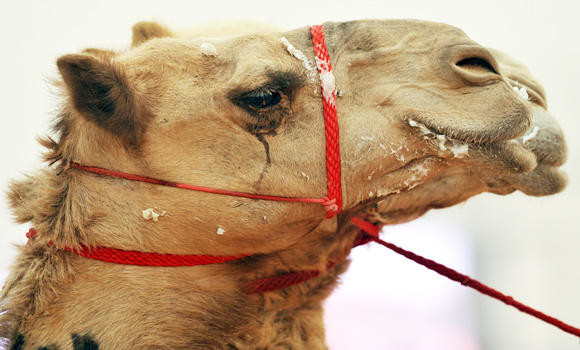A Saudi expert on infectious diseases on Thursday reaffirmed the link between the Middle East Respiratory Syndrome (MERS) and camels after research proved that the viruses isolated from a Saudi patient and his camel were 100 percent similar.
“We have succeeded in isolating the coronavirus and proving the role of camels in transmitting this deadly virus to humans,” said Dr. Tariq Ahmed Madani of the King Abdulaziz University Hospital in Jeddah.
Speaking with Arab News, he said the discovery proves that camels are the prime reservoir that allowed the coronavirus to infect and kill humans. “This does not mean camels are the only source,” he said. “This important discovery will help combat and contain the disease,” said Madani, who obtained a fellowship in infectious diseases from the University of Manitoba in Canada.
A total of 72 people have died from MERS out of 212 infected cases in Saudi Arabia.
A 72-year-old Saudi woman died from among seven patients who were diagnosed with the MERS in Jeddah on Thursday. The other six patients include two Saudi men, aged 60 and 70, who are currently being treated at the ICU of a local hospital, while a 54-year-old doctor, a 31-year-old female expat and two Saudi women, aged 40 and 60, have also been diagnosed with the disease and are reported to be in stable condition.
“A total of 187 blood samples from suspected patients were tested at a Jeddah laboratory on Thursday, of which only seven tested positive for the virus,” according to an official.
Madani, meanwhile, emphasized the need to enlighten the public on the disease, especially residents dealing with camels.
He said a research paper on the discovery of the virus would be published in a specialized scientific magazine soon. “This advanced scientific discovery reflects the progress achieved by Saudi Arabia in the medical field,” Madani said.
Related reports — Page 3, 6 & 10
Research on the topic began in November 2013, when a 44-year-old Saudi who was suffering from pneumonia was admitted to the university hospital. He died after 15 days later after his body failed to respond positively to customary treatment.
“We isolated him and succeeded in determining his genetic sequence. A specialized medical team then isolated the same virus from one of the camels owned by the patient,” said Madani.
“We found antibodies for the virus in a herd of nine camels owned by the patient and discovered that these antibodies appeared before the patient was infected. As a result, we were able to prove for the first time that camels are one of the carriers of the virus to humans,” he said.
Patients contract MERS either by direct contact with an infected patient, especially through droplets while speaking, sneezing or coughing, or touching the belongings or objects touched by an infected person.
“It can also spread through direct contact with infected camels,” he said. “Infected camels could show symptoms similar to those manifested by humans.”
“Most reported MERS cases in the world spread from human to human and they had no direct contact with infected camels,” Dr. Madani said.
“There is no proof so far to suggest that drinking the milk of an infected camel can cause the disease,” he said. “Nevertheless, it is advisable to only drink camel milk, or any other type of milk for that matter, after boiling to kill disease-causing germs, including Maltese fever, found in the Najd and Hijaz regions.”
Madani said that the King Fahd Research Center at the university has not yet conducted any research to find a cure for the disease due to lack of human and material resources.
“No report of MERS-related death among camels has been reported so far,” he said.
In Jeddah, authorities are stepping up efforts to contain the deadly virus.
“A total of 44 cases tested positive for the virus in Jeddah from among seven hospitals,” said the official. “Around 2,500 blood samples were tested for the virus in the Western Province.”
The National Scientific Committee for Infectious Diseases (NSCID) has organized field visits in Jeddah to acquire first-hand information about the virus in the wake of the sudden increase in the number of cases.
The Ministry of Health has extended an invitation to the World Health Organization to send experts to evaluate the prevalence of the coronavirus in Jeddah and in other parts of the Kingdom.
According to the health official, the Health Ministry is on 24-hour alert to monitor the virus both within and outside the Kingdom.
MERS-camel link confirmed
MERS-camel link confirmed











